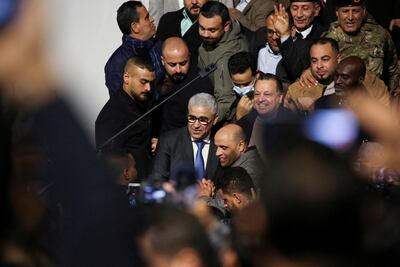Libya's eastern parliament-appointed Prime Minister Fathi Bashagha has retreated from Tripoli after an attempt to enter the capital triggered clashes, his office confirmed.
Violence erupted after Mr Bashagha arrived in Tripoli early on Tuesday, amid a stalemate over control of the capital, where a rival administration led by Abdul Hamid Dbeibah has refused to step down.
Unverified video clips posted online showed fighters in areas of central Tripoli and around the port with the sound of automatic gunfire.
In a statement carried by local media, Mr Dbeibah said his government would “strike with an iron first anyone who harms the security and safety of the citizen”.
“Despite our peaceful entry to the capital, Tripoli, without the use of violence and force of arms, and our reception by the honourable people of Tripoli, we were surprised by the dangerous military escalation carried out by armed groups affiliated with the expired government,” Mr Bashagha said in a statement sent to The National.
Mr Bashagha described the actions taken by the government in Tripoli on Tuesday as “hysterical”, adding that their use of violence and weapons showed “conclusive evidence that it is nationally and morally depraved and does not have any credibility to hold fair and transparent elections”.
Libya had been split between rival eastern and western factions since 2014, before a 2020 truce brought it under a fragile united government.
A plan to hold an election in December collapsed amid arguments among major factions and prominent candidates.
The dispute involved rules governing the elections and the legitimacy of the parliament.
Earlier on Tuesday, Mr Bashagha had promised to carry out his duties despite the unrest.
“We arrived in Tripoli safely and the welcoming messages have not stopped for the past several hours,” he said in a video message on Twitter.
“We will hopefully start our duties tomorrow and work with the people of Libya, be it those who support or oppose us.”
Heavy security was installed in the immediate vicinity of the headquarters of the prime minister’s office near the Tariq Al Seka area of Tripoli, according to sources.
Mr Bashagha, who was based in recent weeks in Sirte, where the eastern-based administration has been holding its own sessions, entered the city through Tripoli's Mitiga airport, officials said.
Mr Bashagha had entered Tripoli overnight accompanied by allied fighters in the hope of taking over government. However, he was quickly met by opposition from forces aligned with Mr Dbeibah, who was appointed through a UN-backed process last year.
In March, politicians in eastern Libya had announced Mr Bashagha, the former interior minister, as the country’s new interim prime minister.
He was supposed to replace Mr Dbeibah, who has been refusing to step aside as prime minister and challenged Mr Bashagha’s nomination.
Members of Parliament have said Mr Dbeibah's mandate expired when the election failed to take place as planned in December.

Stephanie Williams, the UN Secretary General Antonio Guterres' special adviser on Libya, urged both rival parties to “preserve calm and protect civilians”.
“In light of recent reports out of Tripoli, I highlight the fundamental need to preserve calm on the ground and to protect civilians," Ms Williams tweeted shortly after the clashes in Tripoli broke out. "I urge restraint and insist on the absolute necessity of refraining from provocative actions, including inflammatory rhetoric, participation in clashes and the mobilisation of forces.”
Mr Bashagha’s links and roots to Tripoli might have explained his swift retreat from the capital, Libya researcher Jalel Harchaoui told The National.
“As a result of the 2019-2020 trauma, actors native to Tripolitania, including Bashagha, are deeply opposed to the notion of
war in the capital,” said Mr Harchaoui, who has written extensively on the Libyan crisis’ international dimension for several outlets.
The violence that unfolded during Mr Bashagha’s “brief presence inside Tripoli” reflected his “clear failure”, Mr Harchaoui said.
Rival Libyan officials on Sunday resumed talks in the Egyptian capital, the latest UN-led effort to agree on constitutional amendments for elections.
Twelve politicians from Libya’s east-based parliament and 11 from the High Council of State, an advisory body from western Libya, attended the Cairo-hosted talks, parliament spokesman Abdullah Bliheg said.
The failure to hold the vote was a major blow to international efforts to end a decade of chaos in Libya.
It has opened a new chapter in its long-running political impasse, with rival governments claiming power after tentative steps towards unity in the past year.
The oil-rich country has experienced conflict since a Nato-backed uprising toppled and killed long-time dictator Muammar Qaddafi in 2011.
The country has for years been split between rival administrations in the east and west, each supported by different militias and foreign governments.
— With inputs from wires.


